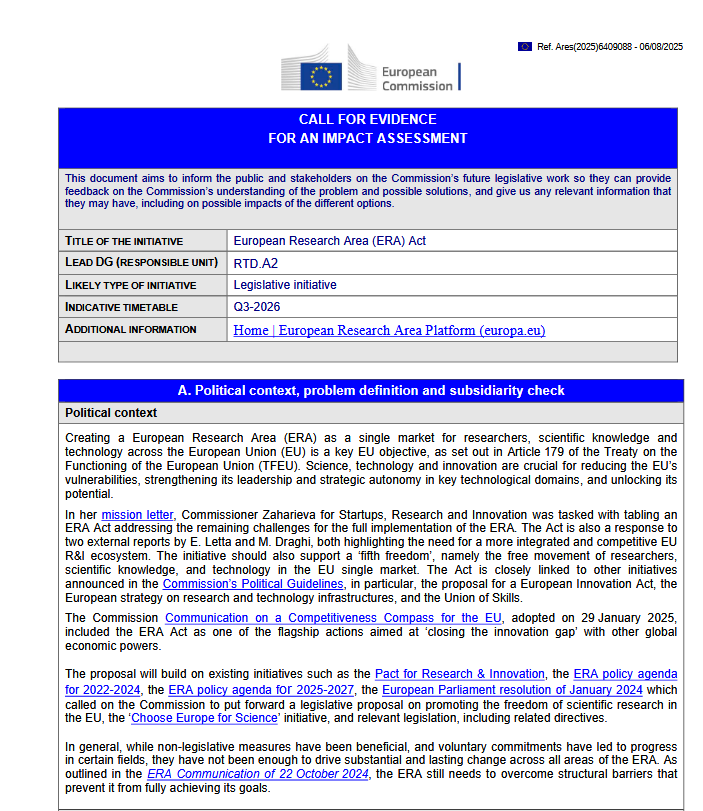The ERA Act will aim to improve the general environment for generating innovation, reducing fragmentation and boosting the EU’s competitiveness, this initiative aims to strengthen R&D investment and bring it up to the 3% GDP target. It will focus research support more on strategic priorities, strengthen alignment between the EU and Member States’ funding priorities, and promote the free movement of knowledge and talent across Europe.
The call for evidence is available here: https://ec.europa.eu/info/law/better-regulation/have-your-say/initiatives/14608-European-Research-Area-Act_en
Innovators, researchers and stakeholders are invited to provide feedback: https://digital-strategy.ec.europa.eu/en/consultations/commission-calls-innovators-and-researchers-shape-future-european-research-area-act
In order to raise awareness about the inclusion and needs of the enlargement countries and more specifically the Western Balkans, the project coordinator Elke Dall provided feedback and input on behalf of POLICY ANSWERS and the Western Balkans Info Hub,
The European Research Area (ERA) must be shaped as an inclusive framework that actively integrates the enlargement countries, particularly the Western Balkans, ensuring they are not left at the periphery of European research and innovation developments. From the POLICY ANSWERS project and the Western Balkans Info Hub perspective, a core recommendation is that tailored support is essential for Albania, Bosnia and Herzegovina, Kosovo, Montenegro, North Macedonia, and Serbia so they can share fully in ERAs benefits and objectives while acknowledging their specific regional contexts. Recent ERA country reports for 2024 illustrate that while these economies are indeed committed to ERA principles, despite not formally signed up. Of course, challenges in research funding, participation in EU programmes and policy alignment persist. Across the region, institutional fragility, limited infrastructure and low participation in European research projects are recurring issues that make convergence with EU standards difficult. Therefore, the ERA Act should incorporate concrete mechanisms that account for these disparities, offering bespoke policy support, knowledge transfer and dedicated funding streams to address the identified gaps. Emphasis must be placed on capacity-building, regional cooperation and greater policy coordination, enabling these economies to improve their position within ERA structures and the wider European R&I ecosystem. Ethics, equality, gender considerations and citizen engagement must be anchored at the core of the European Research Area if the ERA is to be truly transformative for the Western Balkans and enlargement countries. Advancing these priorities is not only essential for fostering a research and innovation environment that is both inclusive and responsible, but also vital for increasing public trust in science and its outcomes. The ERA must support greater citizen engagement by encouraging open dialogue between researchers and the wider public, offering transparent information and opportunities for meaningful participation in the co-design and evaluation of research. Building a culture of trust and inclusion in research helps ensure that societal challenges unique to the region are addressed in a manner that reflects local values and needs, thereby reinforcing the ERAs relevance and legitimacy. Robust monitoring, consistent measurement standards and well-coordinated statistical practices are critical for tracking progress and identifying persistent gaps in ERA integration for the Western Balkans. As outlined in the POLICY ANSWERS projects policy brief on monitoring and reporting, data collection systems across the region remain fragmented, with limited alignment to ERA indicators and with variable data quality and frequency. This hinders the comparability of research and innovation performance against EU benchmarks and makes it challenging to target policies and funding effectively. To address these challenges, there is a pressing need for enhanced coordination on data strategies, capacity-building for statistical offices and support for the systematic adoption of international standards and ERA-specific monitoring frameworks. These improvements will enable evidence-based policy-making, facilitate the benchmarking of progress towards ERA priorities, and ensure that the specific needs and achievements of the Western Balkans are visible and valued within the broader ERA context. Overall, we want to emphasise that the regional context, such as persistent socio-economic disparities, talent mobility challenges, etc., should be reflected in ERA implementation instruments. Only with targeted interventions can the ERA advance its vision of a truly integrated European Research Area and ensure the meaningful participation of the Western Balkans and other enlargement countries in line with shared European values and ambitions.

